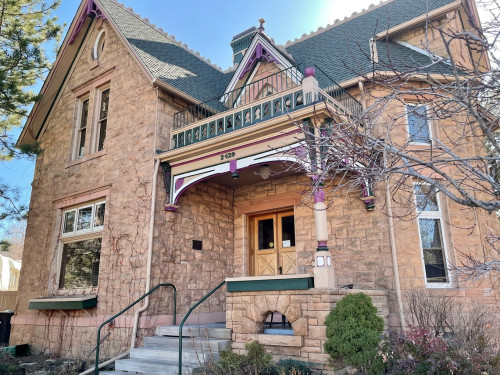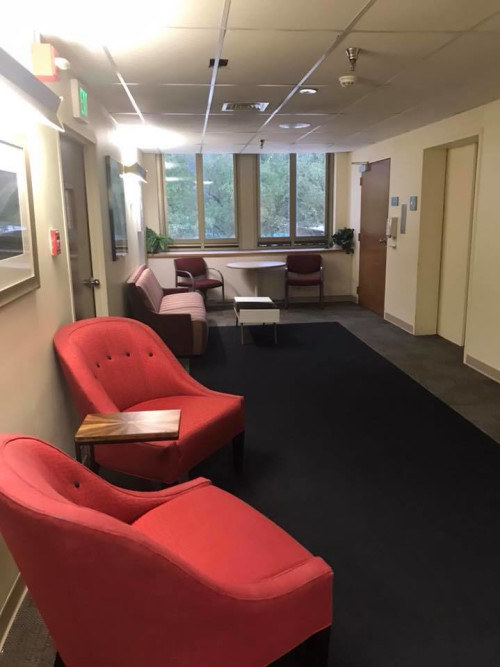





Boulder Integrated Health
Treatment Focus
This center treats substance use disorders and co-occurring mental health conditions. Your treatment plan addresses each condition at once with personalized, compassionate care for comprehensive healing.
Primary Level of Care
Outpatient treatment offers flexible therapeutic and medical care without the need to stay overnight in a hospital or inpatient facility. Some centers offer intensive outpatient program (IOP), which falls between inpatient care and traditional outpatient service.
This provider hasn't verified their profile's information. Are you the owner of this center? Claim your listing to better manage your presence on Recovery.com.
Treatment Focus
This center treats substance use disorders and co-occurring mental health conditions. Your treatment plan addresses each condition at once with personalized, compassionate care for comprehensive healing.
Primary Level of Care
Outpatient treatment offers flexible therapeutic and medical care without the need to stay overnight in a hospital or inpatient facility. Some centers offer intensive outpatient program (IOP), which falls between inpatient care and traditional outpatient service.
Provider's Policy
Boulder Integrated Health accepts most private insurance, including Aetna, Blue Cross Blue Shield, and Friday Health Plans.
Boulder Integrated Health
Boulder Integrated Health
About Boulder Integrated Health
Boulder Integrated Health, located in bustling Boulder, Colorado, offers partial hospitalization (PHP), intensive outpatient (IOP), and outpatient (OP) programs for those struggling with addiction. They pride themselves on offering a complete continuum of outpatient programs and services for addiction and co-occurring mental health conditions, using evidence-based therapies such as cognitive behavioral therapy (CBT), dialectical behavior therapy (DBT), eye movement desensitization and reprocessing therapy (EMDR), as well as experiential therapies and medication-assisted treatment (MAT).
Each client is assigned a Case Management Team made up of a licensed therapist and a Certified Addictions Counselor. The Case Management Team helps identify the issues in the client’s life, and provides the support and resources that will best support the client to address each issue. The Boulder Integrated Health team works with the client and their family to create an individualized plan. Depending on the individual, the care plan could include referral to a more intensive residential treatment program, enrollment in an outpatient program, recommendations for legal, vocational, or academic support, recommendations for further therapeutic treatment, or assistance in connecting with a local recovery community.
Experiential Therapies
Boulder Integrated Health uses a wide array of experiential therapies, including equine and animal assisted therapy, yoga, acupuncture, art therapy, and music therapy. Combining evidence-based treatment with an underlying holistic approach, BIH integrates traditional with holistic therapeutic programming to get the most individualized and effective results for patients.
Partial Hospitalization Program (PHP)
PHP, otherwise known as day treatment, can be a good option for clients who have completed a residential program and would benefit from structured support as they transition into their new lives. This program is for those patients not requiring constant medical monitoring, and who are not at risk for self-harm. The program involves participation of 20+ hours a week, and is the highest level of outpatient programming. Day treatment clients will return home or to a sober living house each night.
Intensive Outpatient Program (IOP)
Boulder Integrated Health offers a flexible IOP program, designed to support long-term recovery while allowing balance for the demands of school, work, and family. The program involves 10+ hours of treatment a week, with both morning and afternoon options available. Boulder Integrated Health’s IOP program is 90 days in length; clients meet 3 times per week for 3 hours in group therapy, and receive at minimum 1 hour of individual therapy each week.
Outpatient Program (OP)
Boulder Integrated Health’s Outpatient Program includes 1–3 90-minute sessions a week. These sessions can be scheduled as the week progresses, adapting to the client’s changing needs. Treatment consists of counseling, education, and providing a network of support as clients continue on their recovery journey.

Center Overview
Treatment Focus
This center treats substance use disorders and co-occurring mental health conditions. Your treatment plan addresses each condition at once with personalized, compassionate care for comprehensive healing.
Joint Commission Accredited
The Joint Commission accreditation is a voluntary, objective process that evaluates and accredits healthcare organizations (like treatment centers) based on performance standards designed to improve quality and safety for patients. To be accredited means the treatment center has been found to meet the Commission's standards for quality and safety in patient care.
Insurance Accepted
Pricing and Program Length
Estimated Center Costs
Center pricing can vary based on program and length of stay. Contact the center for more information. Recovery.com strives for price transparency so you can make an informed decision.
Levels of Care








Your Care Options
Specializations
Drug Addiction
Drug addiction is the excessive and repetitive use of substances, despite harmful consequences to a person's life, health, and relationships.
Holistic
A non-medicinal, wellness-focused approach that aims to align the mind, body, and spirit for deep and lasting healing.
Alcohol
Using alcohol as a coping mechanism, or drinking excessively throughout the week, signals an alcohol use disorder.
Who We Treat
Men and Women
Men and women attend treatment for addiction in a co-ed setting, going to therapy groups together to share experiences, struggles, and successes.
Approaches
Experiential
Expressive tools and therapies help patients process past situations, learn more about themselves, and find healing through action.
Holistic
A non-medicinal, wellness-focused approach that aims to align the mind, body, and spirit for deep and lasting healing.
Evidence-Based
A combination of scientifically rooted therapies and treatments make up evidence-based care, defined by their measured and proven results.
Individual Treatment
Individual care meets the needs of each patient, using personalized treatment to provide them the most relevant care and greatest chance of success.
Therapies
1-on-1 Counseling
Patient and therapist meet 1-on-1 to work through difficult emotions and behavioral challenges in a personal, private setting.
Equine Therapy
Guided interactions with trained horses, their handler, and a therapist can help patients improve their self-esteem, trust, empathy, and social skills.
Art Therapy
Visual art invites patients to examine the emotions within their work, focusing on the process of creativity and its gentle therapeutic power.
Animal Therapy
Animals can inspire trust and self-worth. In this experiential therapy, guided interactions are used to improve social skills and emotion regulation.
Eye Movement Therapy (EMDR)
Lateral, guided eye movements help reduce the emotional reactions of retelling and reprocessing trauma, allowing intense feelings to dissipate.
Substances We Treat
Cocaine
Cocaine is a stimulant with euphoric effects. Agitation, muscle ticks, psychosis, and heart issues are common symptoms of cocaine abuse.
Prescription Drugs
It's possible to abuse any drug, even prescribed ones. If you crave a medication, or regularly take it more than directed, you may have an addiction.
Benzodiazepines
Benzodiazepines are prescribed to treat anxiety and sleep issues. They are highly habit forming, and their abuse can cause mood changes and poor judgement.
Ecstasy
Ecstasy is a stimulant that causes intense euphoria and heightened awareness. Abuse of this drug can trigger depression, insomnia, and memory problems.
Co-Occurring Disorders
A person with multiple mental health diagnoses, such as addiction and depression, has co-occurring disorders also called dual diagnosis.
Psychedelics
Hallucinogenic drugs—like LSD—cause euphoria and increased sensory experiences. When abused, they can lead to depression and psychosis.
Drug Addiction
Drug addiction is the excessive and repetitive use of substances, despite harmful consequences to a person's life, health, and relationships.
Heroin
Heroin is a highly addictive and illegal opioid. It can cause insomnia, collapsed veins, heart issues, and additional mental health issues.





